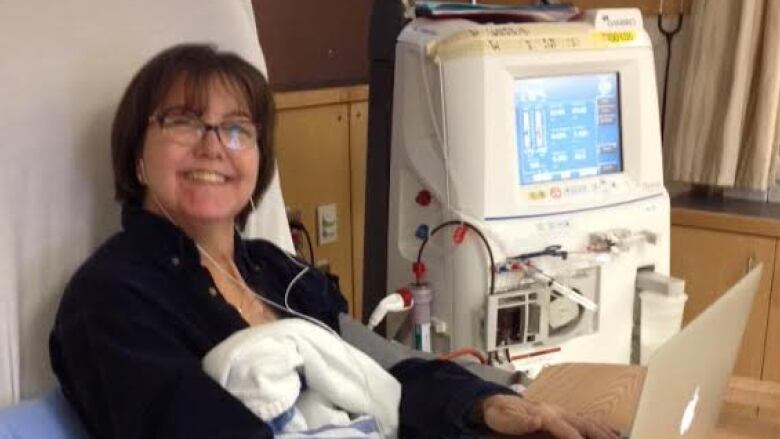P.E.I. dialysis patient wants 3rd treatment shift added at QEH
'For me personally, I just want to be close to my family'

One Charlottetown resident is calling for a third shift to be added to the dialysis clinic at the Queen Elizabeth Hospital because making the trip to Summerside for treatment is difficult.
Ann Bolger is one of six patients that has to travel to Prince County Hospital in Summerside, P.E.I., to receive treatment.
"I would rather go in the evening in Charlottetown than I would having to travel to Summerside," Bolger said.
"The time of day won't matter to me as long as I'm in and out and able to go home where my support is."
- Some Charlottetown patients must travel to Summerside for dialysis
- P.E.I. woman looking for a second kidney after 26 years
The high volume of patients needing dialysis in the Charlottetown area has filled the Queen Elizabeth Hospital seats to capacity.
Bolger, who is waiting to have her second kidney transplant 26 years after she received her first one, was asked to travel to Summerside because she is considered to be one of the more stable patients.
When the request initially came, Bolger's husband had just had a stroke so she was allowed to have her treatment in Charlottetown. But since Christmas Eve, she's has been making the 45-minute trip each way three times a week for her four-hour treatment.
"There's a lot of people who travel, including myself, that have their support in Charlottetown people that would come visit them while they're on dialysis. My family's all in Charlottetown, my support system, so it's hard to be in another city that way."
'It will take less out of me'
Bolger said she gets up at 6 a.m. each day to be ready when the van leaves at 6:45. Health PEI has provided a free shuttle service or the option of a $50 per week stipend for gas.
So I don't see it happening in the near future if there's no changes. Ann Bolger
Her treatment begins between 8 and 8:30 a.m. and she is home by 2 p.m., making for a long day.
"It's most of my day. It's tiring as well so usually when I get home I eat and have a nap," she said.
"It will take less out of me not to be in a van for two hours, three times a week ... You're already on the machine for 12 hours."
Family support
Bolger does like being with the regular group that makes the trip, with most of their conversations revolving around how everyone is doing and upcoming surgeries.
"We can support each other," said Bolger, but adds it is still exhausting.
She said adding a third shift at QEH would allow her to be closer to her family.
"For me personally, I just want to be close to my family," she explained. "I want to spend time with them while I'm on the machine and not be by myself."
With three or four people ahead of her on the list to have treatments in Charlottetown, Bolger isn't sure how long she will have to continue travelling for treatments.
"So I don't see it happening in the near future if there's no changes."

'I'm really impressed'
But Trina Ralph, executive director of the Kidney Foundation of Canada in Atlantic Canada said travel for dialysis is commonplace for people in many provinces, with some travelling up to 90 minutes one way for treatment.
Ralph said she is impressed Health PEI has offered the free shuttle
"We of course want everybody to be able to dialyze as close to home as possible but I'm really impressed and I don't think I've seen it anywhere in Atlantic Canada," said Ralph.
"Other places across Canada the patients may be on their own and then have to avail of our short term financial assistance program to help cover their extended expenses. So the renal program has done something really unique and maybe even precedent setting."
- MORE P.E.I. NEWSINo increase for most P.E.I. property tax assessments in 2016
- MORE P.E.I. NEWSIMillvale, P.E.I., residents concerned with high-voltage lines
With files from Nancy Russell












_(720p).jpg)


 OFFICIAL HD MUSIC VIDEO.jpg)
.jpg)



























































































